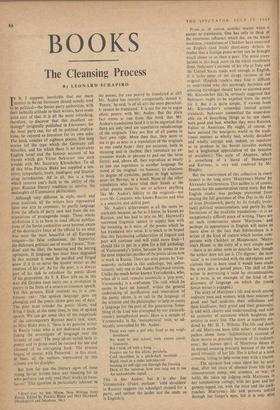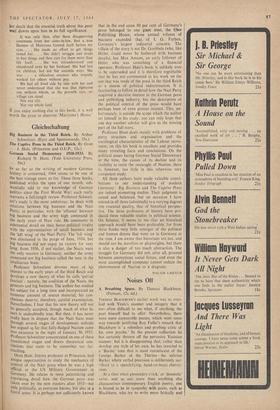BOOKS
The Cleansing Process
By LEONARD SCHAPIRO
TT is, I suppose, inevitable that our main 'interest in Soviet literature should usually tend to be political—the Soviet party authorities, with their imbecile attitude to their writers, have made quite sure of that. It is all the more refreshing, therefore, to discover that this excellent an- thology* (originally published in Encounter, for the most part) can, for all its political implica- tions, be enjoyed as literature for its own sake. The book consists of eighteen poems, five long stories (of the type which the Germans call Novellen, and for which there is no equivalent English term) and the famous account of his travels which got Victor Nekrasov into such trouble with Mr. Secretary Khrushchev. To all of this Miss Patricia Blake has supplied a sen- sitive, sympathetic, lively, intelligent and illumin- ating introduction. All in all, this is a book which restores one's faith in the ability of the great Russian literary tradition to survive the onslaughts of Communist philistinism.
Although very different in style, merit and even tradition, all the writers here represented have one aim in common: to purify language from the effects of party cant and from the en- crustations of propaganda usage. Those whose misfortune it is to have to read official publica- tions of the Soviet authorities soon become aware of the destructive force of the official lie on what was once the most beautiful of all European tongues—the false enthusiasm, the hypocrisy, the dishonest political use of word's ('peace,' free- dom' and the like), the boasting and the leering, optimism. If language has once been degraded in this manner it must be purified and forged anew if it is to serve the honest writer as the medium of his art. As for the poet, it is always part of his task to refashion the poetic idiom of his generation. As T. S. Eliot tells us, in this way did Dryden once carry out a revolution in poetry in the form of a return to common speech. Yet this process, Eliot reminds us, is a con- tinuous one: 'the spoken language goes on changing and the poetic idiom goes out of date.' The poet must remake the poetic idiom, and bring it back, at the same time, to that of spoken speech. We can get some idea of the magnitude of the contemporary Russian poet's task, since, as Miss Blake puts it, 'there is no genuine writer in Russia today who is not dedicated to estab- lishing the sovereignty of language over the tyranny of cant.' The pure idiom suited both to poetry and to prose must be rescued for use and cleansed of its corrupting husk. The process began, of course, with Pasternak: in this sense, at least, all the authors represented in this volume are his disciples.
But how far can the literary agon of these young Soviet writers have any meaning for us who perforce can only read their works in trans- lation? This question is particularly relevant to * HALF-WAY TO TIM MOON. New Writing from Russia. Edited by Patricia Blake and Max Hayward. (Weidenfeld and Nicolson, 30s.) the poems, for can poetry be translated at all? Mr. Auden has recently categorically denied it. 'Poetry,' he said, 'is of all arts the most parochial. It cannot be translated.' It is not for me to argue abotit poetry with Mr. Auden. But the plain fact stares at one from this book that Mr. Auden's translations (and it is to be regretted that there are only two) are superlative refashionings of the originals. They are first of all poems in their own right. More than that, they seem to me to get as near to a translation of the originals as one could ,hope: they are accurate, both in meaning and in rhythm; they introduce no ex- traneous words or phrases to pad out the verse forms; and, above all, they reproduce as nearly as one can reproduce in another language the mood of the original—its humour, its allusions, its degree of cynicism, pathos or high serious- ness—its flavour, in a word. None of the other translators who have tried their hands at the other poems seem to me to achieve anything like Mr. Auden's fidelity to the originals—not even Mr. Conquest, who knows Russian and who is a sensitive and skilful poet.
Mr. Auden's achievement is all the more re- markable because, so far as I know, he knows no Russian, and has had to rely on Mr. Hayward's renowned linguistic talents to supply him with the meaning, as it were, of the poems which he has translated into verse. It is much to be hoped that this fascinating collaboration of linguist and poet will continue and will yield more fruit—I should like to put in a plea for a full anthology of Voznesensky's lyrics, because he seems to me the most important purifier of the poetic idiom now at work in Russia. There are nine poems by Voz- nesensky included in this anthology, but unfor- tunately only one in the Auden-Hayward version. Unlike the much better known Yevtushenko, who, when all is said, remains essentially a 'pop poet,' Voznesensky is a craftsman. The task which he seems to have set himself, within the general undertaking of purification and renovation of the poetic idiom, is to call in the language of the scientist and the philosopher to help' to create a language for the poet of this generation. Some- thing of the kind was attempted by our sixteenth- century metaphysical poets. Here is a sample of Voznesensky in his 'metaphysical' vein, so ad- mirably reversified by Mr. Auden: There was once a girl who lived in my neigh- bourhood.
We went to one school, took exams simul- taneously.
But I took off with a bang. . . .
Forgive me for this idiotic parabola.
Cold shoulders in a pitch-dark vestibule. . Rigid, erect as a radio antenna-rod Sending its call-sign out through the freezing Dark of the universe, how you rang out to me An undoubtable signal. . . .
This is fine Auden; but it is also fine Voznesensky. (Finer, perhaps: 'cold shoulders' in Russian suggests the schoolgirl dressed for a party, and neither the larder nor the snub, as in English!), Prose is, ot course, another matter when it comes to translation. One has only to think of the enormous influence which the, on the whole mediocre, translations of Chekhov have exercised on English (and Irish) short-story writers to realise that a foreign prose-writer can be brought much closer to us than a poet. The prose trans- lations in this book seem on the whole excellently done. Nekrasov's account of his trip to Italy and the United States reads well enough in English, if it lacks some of the slangy raciness of the original. (English readers may find It difficult to understand why this seemingly harmless and amusing travelogue should have so alarmed poor Mr. Khrushchev tha: he seriously suggested that Nekrasov ought to be expelled from the party for it. But it is quite simple, if viewed from Mr. Khrushchey's somewhat limited artistic standards. Nekrasov committed the unpardon- able sin of describing things as he saw them, both good and bad, whether they were Russian, Italian or American. He ought, of course, to have painted the bourgeois world in the tradi- tional manner as wholly bad, wholly decadent and wholly corrupt and, indeed, so repulsive as to produce in the Soviet traveller nothing but a heightened appreciation of the beauties of socialism.) The style of Aksenov, which is something of a blend of Hemingway and Kerouac, is very well rendered by Mr. Hingley.
But the masterpiece of this collection in every respect is the long story `Matryona's Home' by Alexander Solzhenitsyn. This author is, of course, famous for his concentration camp story. But the English reader was perhaps prevented from sensing the full greatness of One Day in the Life of Ivan Denisovich, partly by its (totally irrele- vant) political sensationalism, and partly ly the limitations of the available translations—it is an exceptionally difficult piece of writing. There are no such irrelevancies about `Matryona,' and perhaps its appearance in English will make us more alive to the fact that Solzhenitsyn is a writer of the kind of stature which invites com- parison with Chckhov or Maupassant. 'Matry- ona's Home' is the story of a very simple saint —there is no other term to describe her, though the author does not use it. (To digress: the term 'saint' is so overloaded with the old-regime asso- ciations that to have used it would have made the story into a period piece. The skill of this writer in portraying a saint by circumlocution, as it were, is an example of the kind of re- discovery of language on which the young Soviet writer is engaged.)
The story of Matryona's life and death among ordinary men and women, with their mixture of good and bad qualities, their selfishness and their kindliness, their greed and their generosity, is told with charity and understanding, and with an economy of statement which heightens the artistry in every line. The story is superbly ren- dered by Mr. H. T. Willetts. The life and death of old Matryona have little either of drama or pathos about them—Solzhenitsyn's account of
them moves us precisely because of its ordinari- ness: the human spirit of Matryona shines in its eternal meaning precisely because of the tem- poral triviality of her life. She is killed at a level Crossing, trying to help some men with a tractor.
. . . The narratorhad come upoi . her by acci- dent, after ten years of absence from life (in a concentration camp, one assumes, or war, or both). He takes up lodging with Matryona in her tumbledown cottage, with her goat and her gammy-legged cat, with the mice and the cock-
roaches. Matryona's life and persona unfold through her lodger's eyes, but it is only after her death that the essential truth about this poor waif dawns upon him in its full significance.
It was only then, after these disapproving comments from her sister-in-law, that a true likeness of Matryona formed itself before my eyes. . . . She made no effort to get things round her. . . . She didn't struggle and strain to buy things and then care for them more than life itself. . . . She was misunderstood and abandoned even by her husband. She had lost six children, but not her sociable ways. She was . . . a ridiculous creature who stupidly worked for others without pay.
We had all lived side by side with her and never understood that she was that righteous one without whom, as the proverb say,,, rio village can stand.
Nor any city.
Nor our whole land.
If You enjoy nothing else in this book, it is well worth the price to discover `Matryona's Home.'

























 Previous page
Previous page